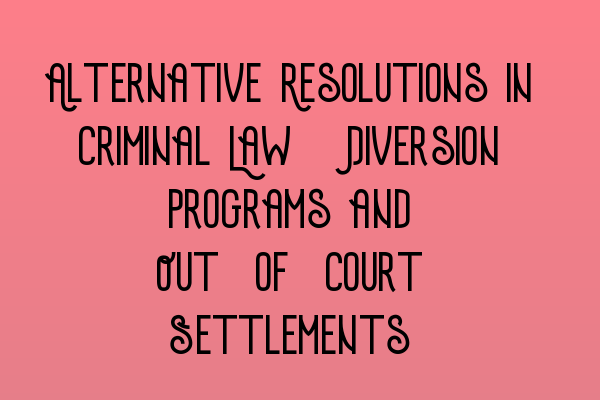Alternative Resolutions in Criminal Law: Diversion Programs and Out-of-Court Settlements
Welcome to SQE Criminal Law & Practice Law UK! In this blog post, we will explore the topic of alternative resolutions in criminal law, specifically focusing on diversion programs and out-of-court settlements. These alternative resolutions offer an alternative approach to traditional court proceedings, providing unique benefits and opportunities for all parties involved. Let’s dive in!
Diversion Programs: A Second Chance
Diversion programs are designed to provide offenders with an opportunity to avoid the formal criminal justice system, especially for first-time or non-violent offenders. Instead of facing prosecution, these individuals are diverted into programs that aim to address the underlying causes of their behavior and reintegrate them into society as law-abiding citizens.
For example, a diversion program may involve participation in community service, counseling, drug or alcohol rehabilitation, or educational programs. These interventions not only address the individual’s specific needs but also reduce the burden on the court system and promote a more rehabilitative approach to criminal justice.
By incorporating diversion programs into criminal law practice, we can potentially reduce the likelihood of future offenses, alleviate overcrowding in prisons, and promote offender rehabilitation, ultimately contributing to a safer and more just society.
If you’re interested in expanding your knowledge and expertise in criminal practice, don’t miss out on our Workshops and Seminars on Criminal Practice: Expanding Your Expertise article.
Out-of-Court Settlements: Negotiating a Resolution
Out-of-court settlements are another alternative resolution in criminal law that allows parties to resolve a dispute or offense without going through a formal court trial. This process involves negotiation and agreement between the accused, the victim, and their respective legal representatives.
Out-of-court settlements can be particularly beneficial when there is strong evidence but the complexity or sensitivity of the case calls for a more tailored solution. These settlements often involve restitution, compensation, community service, or even apologies and reconciliation between the parties involved.
To stay informed and prepared in the ever-evolving landscape of UK criminal laws, be sure to check out our article Updates in UK Criminal Laws: Staying Informed and Prepared.
The Advantages of Alternative Resolutions
Both diversion programs and out-of-court settlements offer a range of advantages over traditional court proceedings, such as:
- Efficiency: Alternative resolutions can provide a more efficient and cost-effective way to resolve certain criminal cases, reducing the burden on the court system.
- Rehabilitation: By addressing underlying issues and providing targeted interventions, alternative resolutions have the potential to promote offender rehabilitation and reduce recidivism.
- Victim Participation: Alternative resolutions often give victims a greater say in the outcome and allow them to voice their concerns, seek restitution, and achieve a sense of closure.
- Community Engagement: Diversion programs and out-of-court settlements involve the community in the process, fostering a sense of collective responsibility and encouraging community-based solutions.
For more detailed analysis and insights into criminal evidence rules, check out our comprehensive article Decoding Criminal Evidence Rules: A Detailed Analysis.
It’s important to note that alternative resolutions are not suitable for all cases, especially those involving serious offenses or repeat offenders. However, they serve as valuable tools in the criminal law system, providing opportunities for rehabilitation, resolution, and community engagement.
If you’re interested in enhancing your SQE criminal law study group experience and learning from your peers, we highly recommend reading our article Enhancing Your SQE Criminal Law Study Group Experience.
Ensuring Rights of Victims: Legal Protections and Support
While alternative resolutions can offer benefits to offenders, it’s crucial to ensure the rights of victims are not overlooked. Victims deserve legal protections and support throughout the process, including access to victim support services, information about their rights, and the opportunity to provide input into the resolution.
Our article Ensuring Rights of Victims in Criminal Procedures: Legal Protections and Support delves deeper into how the criminal justice system strives to protect the rights and wellbeing of victims.
In conclusion, alternative resolutions such as diversion programs and out-of-court settlements present valuable options in criminal law practice. They offer unique opportunities to address the needs of offenders, victims, and the community while promoting efficiency, rehabilitation, and victim participation. As legal professionals, it’s essential to stay informed about these alternative resolutions and their potential impact on the criminal justice system.
We hope you found this blog post informative. If you have any further questions or would like to attend our workshops and seminars on criminal practice, feel free to contact SQE Criminal Law & Practice Law UK. Thank you for reading!
